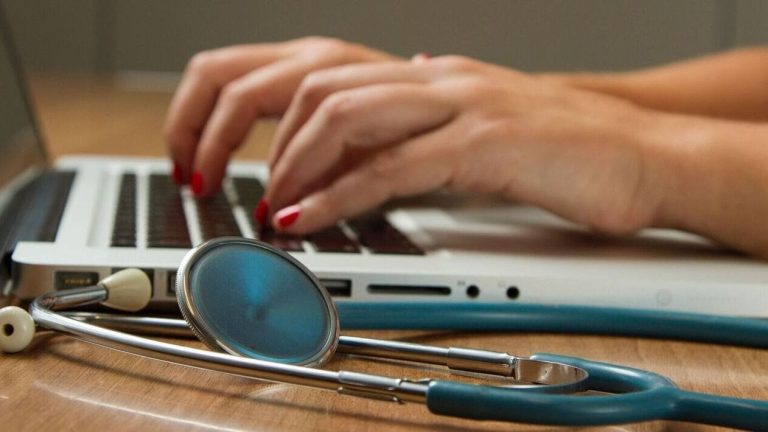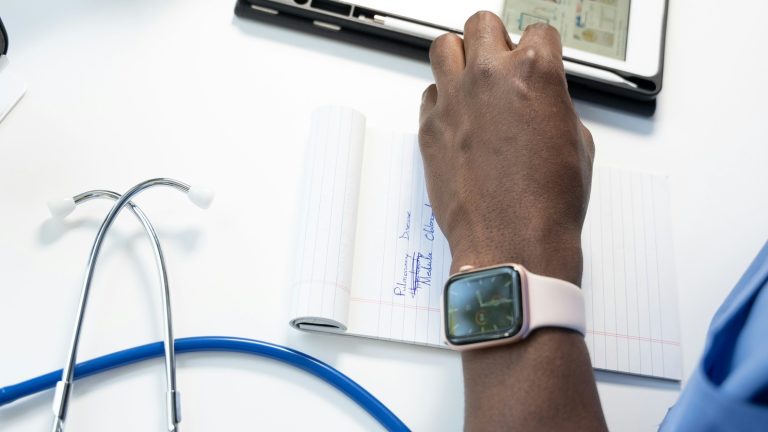Contents:
With extensive experience in the healthcare domain, I know that developing healthcare applications comes with a number of challenges, both technical and organizational. As the domain is highly regulated, healthcare app development requires complex functionality and a high level of security during patient data processing. In this guide, I will explain some aspects of healthcare app development and show how our team can be helpful on your way to success.
Healthcare Software Ecosystem: What’s Inside?
A healthcare ecosystem can be defined as a set of capabilities and services that incorporate main participants (patients, hospitals, clinics, suppliers, and platform and service providers) through innovative healthcare technologies.
Let’s see how particular business goals can be achieved by implementing software modules into a healthcare app. All these modules can be integrated into an EHR system to provide integrity of patient data between the applications. The main goal of building a healthcare ecosystem is to achieve more integrated data sharing, and greater transparency and security for patients and healthcare providers, whether you are a healthcare institution or vendor who offers healthcare services.
ERP, HMS, CRM systems for health organizations
Efficiency and cost reduction in healthcare depend much on healthcare management, and positive changes can be achieved through the automation of business processes, with Enterprise Resource Planning (ERP), Hospital Management Software (HMS), and Customer Relationship Management (CRM) systems. This approach applies to hospitals of all sizes.
MobiDev has developed several platforms for healthcare administrative tasks to improve resource management and increase the quality of medical services. Not only did our team develop those platforms, but we also adjusted them for mobile devices to provide medical professionals with a simple and smooth solution for their needs.
Health insurance platforms for clients
To simplify the process of applying for health insurance, healthcare institutions and insurance providers can benefit from health insurance apps and platforms. At MobiDev, we have such projects in our portfolio, so we can ensure a high level of expertise in this subdomain.
Solutions for medical records organizing
While traditional paper-based medical journals are already less commonly used, there is still room for improvement in this regard. Medical professionals are in need of custom healthcare software development to create user-friendly mobile or web applications that smoothly manage patient medical records. These applications can organize and filter information, lowering the likelihood of human errors due to data overload. Moreover, voice inputs can replace manual note-taking, allowing medical specialists to transfer patient information directly into the app during medical examinations.
Systems for medical data transfer
The transfer of medical data, which includes monitoring basic parameters like body temperature or blood pressure, plays a critical role in the diagnostic process and patient care. Often, these tasks are primarily conducted by medical staff and then manually transferred into some digital systems. However, we can predict a future where the majority of patients will effortlessly measure their vital signs using smartphones and other devices. This transition will significantly enhance the speed and manageability of data transfer.
Apps for efficient tracking and planning
Healthcare apps might serve as tools for optimizing time management and treatment regimens. For patients, simple calendar apps can help keep in mind doctor appointments, vaccination schedules, and medication reminders, while also automating the gathering of vital parameters to handle chronic illnesses. While health maintenance requires a lot of effort and is time-consuming, a user-friendly healthcare mobile app can significantly simplify this process.
References for medical professionals
In many doctor’s offices, the challenge of navigating medical and drug reference books has become a thing of the past. For doctors who need to work on-the-go or in remote locations, mobile devices have become the best solution for accessing repositories of reference information.
AI systems for paperwork automation
Even today, many hospitals still have to deal with paper documentation on a day-to-day basis. These items can be patient prescriptions, surgery sruveryss, patient registration and admission forms, and health insurance claims. With the OCR technology, the processing of paper documentation can be automated. Basically, anything that a hospital can deal with in paper form, can be digitized and automated to some degree.
Systems for diagnostic and healing process tracing
Some diagnostic procedures do not require complex equipment, making smartphones and tablets a more practical choice for doctors than conventional tools, diagrams, and instruments. Their portability is especially beneficial for doctors who need to work while on the move.
For one of our clients, our team created an app to track the wound-healing process in patients. Patients were supposed to take photos of the particular areas, then the specific algorithm would calculate the size of the wounded area to help medical professionals make better decisions for their treatment.
Telemedicine applications
If it’s possible, patients can benefit from quick online appointments via telemedicine with the help of healthcare mobile and web apps. Such virtual appointments are more convenient and easier to book, especially when compared to traveling to a distant hospital. Messaging systems can be used for smooth and fast communication when patients need immediate advice from their doctors.
Our team has a case for a full-featured telemedicine app development to connect patients and doctors. With the help of a telemedicine platform, patients can easily book appointments via a convenient online portal. It’s also possible to come up with asynchronous information for review to make a medical assessment more convenient. By providing more flexibility to medical staff and improving the patient experience, the platform allows for delivery of healthcare to patients in the patient’s preferred setting. For medical professionals, it can also help minimize the chances of burnout, improve overall patient health outcomes, and improve patient satisfaction.
Apps for patient education and support
Healthcare mobile applications with a focus on patient education empower doctors to communicate essential information to patients in a user-friendly manner. Interactive apps help doctors provide comprehensive explanations of medical conditions and symptoms, ensuring patients have a deeper understanding of their health.
Fitness and well-being apps
Nowadays, wellness and well-being mean not only disease prevention but also efforts to achieve a well-balanced lifestyle, including regular physical activity and healthy eating. Fitness and eating habits tracking apps have become popular tools to help people achieve their health goals. Mobile and web applications in this domain are popular with the potential to improve work efficiency and overall quality of life.
When it comes to this subdomain, MobiDev has an excellent example in the portfolio. Our team created a cloud platform for group therapy and well-being. The GroupWell platform is a HIPAA-compliant, cloud-based service offering preventative care wellness groups, behavioral change groups, and mental health treatment groups held by licensed therapists and certified coaches. Members are matched to affinity groups with people like them based on a number of variables. Members can also search for groups using detailed filters to find the best match.
While working on this project, our experts collaborated with the in-house team to provide HIPAA-compliant app development, implemented custom UI/UX design along with the Ant Design library to optimize development timelines, and developed a comprehensive measurement, monitoring, and analytics system to meet the business needs of the client. As a result, customers can enjoy a full-scale and user-friendly application for mental health and well-being that is not only secure but also easy to use.
Chatbots for customer service
Customer service chatbots can help automate tasks that would otherwise be done by customer service agents, and the healthcare industry isn’t an exception. For one of our clients, our team developed a customer service chatbot from scratch to fit the client’s business needs using:
1. Microsoft Azure Communication Services
- Conversational Language Understanding — to detect a user’s intent from their input to manage the following action in the bot’s logic depending on the intent.
- Custom Question Answering — to detect a user’s intent and provide it with an appropriate answer.
2. Microsoft Bot Framework — for building the bot itself and handling the bot’s logic.
3. Application Insights — for collecting the logs from bot service (and some custom logs as well).
4. Power BI — for the presentation of the logs in particular visual forms (as graphs, tables, diagrams etc.)
AI in Healthcare App Development
Artificial Intelligence in healthcare helps with everything from predicting health risks, and end-to-end drug discovery and development to transcribing medical documents. Cutting-edge healthcare solutions use AI and ML algorithms for early diagnosis, identifying health patterns, and analyzing huge amounts of health data. Thus, medical professionals can make more informed decisions and adjust patient care to meet their specific needs more quickly.
Usage of AI in Healthcare Apps
Diagnosis: AI can process enormous amounts of medical data to help doctors intervene early and develop more precise diagnoses. For example, our team worked on a speech processing model that predicts dementia risk, including the pitfalls and challenges in speech classification tasks. Our experts figured out that applying neural networks to analyzing dementia audio recordings can generate accurate suggestions.
Prescription: AI can help to make decisions about which prescription medications are most effective for a patient, taking into account the whole array of information on this particular patient.
Medical imaging: AI can assist medical staff in analyzing medical images, such as X-rays, ultrasounds, and CAT scans. With the help of advanced mechanisms, it can also detect anomalies in these images more effectively than a human could to detect cancer.
Working with patient records: AI can ingest and analyze the extensive amounts of patient data available in electronic health systems. The insights of this analysis can help predict diseases and develop preventive measures for patients at risk.
Healthcare App Compliance: Risks and Regulations to Consider
Before we move to some aspects of the healthcare app development process, let’s take a look at some risks and regulations that are in place in this industry. Since healthcare apps gather and store individuals’ health data, lowering the risks of data breaches is critical. These breaches can lead to negative consequences in various forms, including unauthorized data access, hacking, data leaks, and uploading malware programs.
Furthermore, healthcare apps must go through approval processes by relevant healthcare industry organizations to ensure compliance with regulations. Managing the technological aspects of healthcare applications to ensure healthcare data security contributes to this challenge, as developing a compliant app and getting the necessary approvals requires additional resources like time and money.
While developing healthcare apps, it’s necessary to stay in line with local and international regulations, which are essential for ensuring secure app operation and protecting data privacy.
In different countries and regions, there are specific regulations that apply to healthcare applications.
- HIPAA. This standard is particularly relevant to apps that transmit, record, and store protected healthcare information (PHI) and is mandatory for apps developed for the United States market. HIPAA has been protecting the confidentiality, integrity, and accessibility of healthcare data since 1996. The subsequent section outlines the main requirements that a HIPAA-compliant app must meet. Please pay attention that building applications with HIPAA compliant AI features requires a thorough understanding of these regulations.
- HiTECH. Implemented in the United States, HiTECH strengthens the HIPAA standard and promotes the wider adoption of electronic healthcare records in healthcare facilities. This advancement has led to improved healthcare and enhanced care coordination.
- CCPA. This U.S. act rules how organizations collect, process, and delete personal information, similar to the European GDPR. Under CCPA, individuals can request information about data collection, processing, and storage, and have the right to request the deletion of their data.
- PIPEDA. Adopted in Canada, this act focuses on data privacy and enhances the security of user data stored in healthcare apps. According to this legislation, data encryption as well as strong procedures for user authentication are required during data transmission. Data collection must also be performed with the user’s consent.
- GDPR. Introduced in the European Union in 2018, GDPR protects personal data, making it essential for apps operating within the EU to comply with these regulations. GDPR applies to companies that both collect and process personal data.
- DPA. Applicable to healthcare apps in the United Kingdom, DRA is actually the UK’s implementation of GDPR, protecting personal data gathered, processed, and stored by companies and apps, including healthcare ones. The act establishes conditions for collecting personal data and governs third-party access to such data.
How to Develop a Healthcare App: A Step-by-Step Process
In this section, we will talk about the development process using the example of developing an EHR system from scratch.
Step 1: Identify pain points your solution is going to address
Answer the following questions:
- What is the key purpose and the problem that you are going to solve? Tracking hospital inventory? Managing patients’ records? Planning resources? An all in one?
- Who will be the users? Mainly doctors and nurses or administrative staff, maybe patients or their relatives?
- Research the solutions that are the same or similar to yours and make sure that your app does something better or does something that competitors can’t.
Step 2: Define and learn about your target audience
Understanding the needs of your users, with attention to local regulations, particular clinic’s practices, and even preferred device screen resolutions, plays a crucial role in shaping the future of your healthcare solution.
Step 3: Ensure compliance
The healthcare industry is highly regulated, so you need to be sure that your app meets all the requirements in a specific region or country. You can find the list of standards and regulations that you should follow, in the previous section of our healthcare app development guide.
Step 4: Create UX and UI Design
During this step, you need to map user journeys and design user interface components to ensure a smooth and user-friendly experience for your future customers.
Step 5: Develop the core features
It’s better to start with a map of secondary, main and killer features that your app will provide to business and end users, and then move to MVP which will include the solution for the major goals which will be extended in the future. Focus on the core functionalities first and make sure that your beta product provides real value to users. During this stage, our health app developers will help you determine and implement all the necessary compliance components.
Step 6. Integrate with other healthcare services
Here is important to integrate the solution with other internal infrastructures, including RIS (radiology information system), LIS (laboratory information system), RCM (revenue cycle management), etc.
Step 7. Test the system
With the help of QA specialists, it is time to detect and resolve app bugs. The QA team also ensures usability aspects, patient data security, and compliance with healthcare regulations like HIPAA.
Healthcare App Features: Must & Nice to Have
Let’s imagine you want to build a custom-tailored and user-friendly EHR system with easy input, storage, display, and transfer of patient data in a HIPAA-compliant way.
The list of possible features may include:
- Appointment scheduling and reminders module with automated and customizable appointment notifications and reminders
- Telemedicine module (medical professional-patient and medical professional-medical professional interaction)
- Visualization module to create patient charts according to the clinic’s needs and physician’s specialty
- Patient’s lab reports and customizable dashboards for patients
- Reference module to provide digital referrals to a laboratory, or radiology department
- E-prescriptions and medication management
- Integrated payments and insurance module to handle co-payments, spending summaries, deductibles, reimbursements, and insurance claims directly in the app
- Speech-to-text recognition for fast and smooth input of doctor’s notes if necessary
- Barcode scanner for vaccination records automation
- Assessment modules to collect and store all required information before medical procedures
- ID cards, account information, and the ability to switch accounts for multiple healthcare plans to make users’ experience better with your app
By integrating these features, the healthcare app will offer users a smooth and efficient healthcare management solution for improving their everyday lives. It is important to note that we are talking about appointment booking apps in this section. If you are going to create, for example, a networking app for healthcare professionals, the list of features will be different.
Costs of Healthcare App Development
As you have already seen, healthcare applications come in various types and with various features. The cost of developing a health app can vary widely depending on the features you want to include and the scope of the work that should be done. For example, if your project requires only front-end development services, it will be less costly than if you want to build a healthcare app from scratch.
Our development process is divided into stages, including the project discovery phase, designing, developing, and testing. MobiDev also provides maintenance and support of the delivered healthcare applications.
Overall, the scope for healthcare projects can range between dozens and hundreds of thousands to millions of dollars. Software like EHR, HMS, and RPM fall into the most expensive category. When it comes to AI features and additional features, they are estimated separately, as these are components that take their own infrastructure and development specialists. That’s why the quote can be estimated only when we know more details about your app idea.
How MobiDev Can Help You Build a Successful Healthcare App
As a software consulting & engineering company, MobiDev always focuses on the best outcomes for our clients. So, here are some reasons why you should choose MobiDev experts for building your healthcare app.
- Expertise in the healthcare domain
We have extensive expertise in various healthcare projects and can work with every facet of the healthcare ecosystem to achieve the business goals of our clients. With the help of experienced developers and innovative approaches, our team creates a technological foundation for administrative staff, doctors, and patients to protect health and save lives.
- Focus on the client
MobiDev understands that every product is unique, so you can expect to get custom services that will fit your business needs in the best way possible. Our experts offer non-trivial solutions and adjust the technological approaches to your project’s goals when it’s necessary.
- Flexibility in development
With MobiDev healthcare solutions, it is possible to provide healthcare services across different settings, with all of the relevant information healthcare providers need. We provide smooth and stable integration of custom applications with installed third-party systems, for example, EHR, or a management system.
- Product security and compliance
As security is crucial for healthcare projects, MobiDev ensures the stability of healthcare applications against digital threats and attacks providing an advanced level of security and healthcare regulatory compliance (HIPAA, GDPR).
Overall, MobiDev experts are ready to guide you through the complex world of digital transformation in healthcare no matter what your business needs are. You can read more about out healthcare app development services and contact us or schedule a call.





